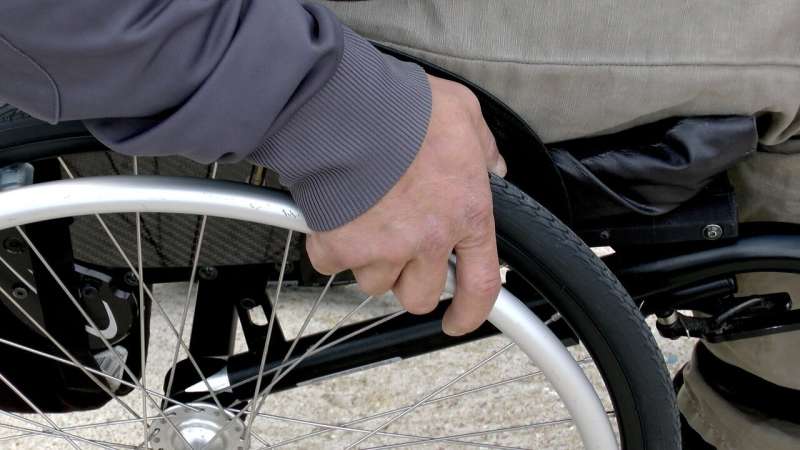
People with disabilities are missing out on screening programs that could help detect cancer early, and after diagnosis, are less likely to survive, our study shows.
Overall, this means people with disabilities are more likely to die from cancer than people without disability.
We draw together evidence showing the striking inequity at the heart of current approaches to controlling cancer.
But there are ways to improve access to the types of screening programs and cancer services many people without disabilities use routinely.
What we did and what we found
We reviewed evidence from 73 studies from around the world. These studies compared cancer outcomes in people with disabilities to those without.
Let’s start with cancer screening, one way to prevent deaths from cancer. Screening picks up early signs of cancer or can prevent it from developing into a problem if found early enough. Early detection usually means more treatment options and higher chances of a good outcome.
However, our review found people with disabilities are missing out on these life-saving screening programs all around the world, including for breast, cervical and bowel cancer.
In fact, some studies in our review showed these cancers are more likely to be diagnosed at an advanced stage in people with disabilities.
Once diagnosed, people with disabilities are still at a disadvantage. We found lower survival rates than cancer patients without disability.
This could be because of delayed diagnosis and inaccessible treatment, and we’d need further research to be sure. But we do have relevant evidence from some studies.
A UK study of cancer deaths in people with intellectual disabilities found more than a third had their cancer diagnosed after going to the emergency department. Almost half of the cancers in the study were already at an advanced stage when diagnosed.
Another review of global evidence found cancer patients with disabilities receive poorer quality cancer care. This included delays in treatment, being undertreated or having excessively invasive treatment. People with disabilities also had less access to in-hospital services and pain medication.
From diagnosis to treatment, global evidence shows people with disabilities are being excluded from health services that many people without disabilities routinely access and benefit from.
The situation is no different in Australia and it is costing lives.
In previous work, we found cancer is a leading cause of earlier deaths among Australians with disabilities. It’s the cause of about 20% of the extra deaths we see in people with disabilities compared to people without.
Why is this happening?
We clearly need to do more to improve health care for people with disabilities. But we also need to take action in other areas to address underlying issues.
People with disabilities are more likely to be poor and live in disadvantaged circumstances than the rest of the Australian population, which may put them at higher risk of cancer.
Many factors that cause cancer—for example, smoking, unaffordable healthy food, and drinking high levels of alcohol —disproportionately impact disadvantaged groups, including people with disabilities.
Many people with disabilities live with additional health conditions, which can lead to a lack of attention to routine issues. This can result in cancer screening and routine care becoming less of a priority.
Buildings where services are provided and medical diagnostic equipment is located are not always accessible for people with disabilities.
The health system itself can be inaccessible, with little support to help people with disability access services. For instance, navigating cancer care can be overwhelming, especially for people who need support for daily activities, transport or communication.
People with disabilities, especially those with intellectual disability, need extra time and support to give informed consent to screening, treatment or procedures—resources and time are particularly overstretched in public health systems.
People with disabilities can also experience both direct and indirect discrimination in health care, which leads to poorer outcomes. This includes discriminatory attitudes towards people with disabilities and their caregivers, and making assumptions about a patient based on their disabilities.
What can we do about it?
For cancer control to be inclusive and work for people with disabilities, we need to look at:
- prevention—public health interventions, such as quit smoking or healthy lifestyle programs, need to be co-designed with and tailored to people with disability
- early detection—national screening programs must develop strategies and take active steps to include people with disabilities. Clinics need to be physically accessible, information needs to be available in a range of accessible formats, and extra time needs to be allocated to get genuine informed consent
- ensuring people with disabilities have a voice—cancer care needs to be tailored to an individual person, as everyone’s needs are different. We need to support and include people with disabilities in conversations about their care so they can make informed decisions. This means providing information in ways that work for them, and allowing time to understand and ask questions
- training health professionals to understand and respond to the needs of people with disabilities and make the adjustments required for optimal cancer care, particularly for people with an intellectual disability.
The Conversation
This article is republished from The Conversation under a Creative Commons license. Read the original article.![]()
Citation:
People with disabilities are dying from preventable cancers, study shows (2025, May 30)
retrieved 30 May 2025
from https://medicalxpress.com/news/2025-05-people-disabilities-dying-cancers.html
This document is subject to copyright. Apart from any fair dealing for the purpose of private study or research, no
part may be reproduced without the written permission. The content is provided for information purposes only.

